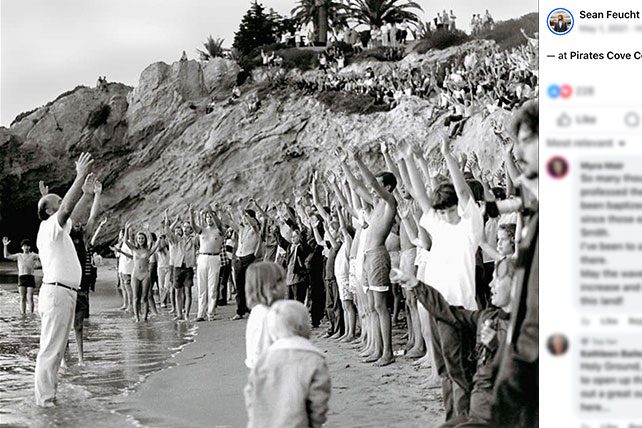Factuality of “Jesus Revolution”
“Jesus Revolution” is based on real events and figures within the Jesus Movement, including the influential roles of pastors Chuck Smith and Lonnie Frisbee. While it adheres to the broad outlines of history, like all historical dramas, it takes creative liberties in depicting personalities, relationships, and events.
Church and Preacher Inspirations for “Jesus Revolution”
The movie is primarily based on Calvary Chapel and its founder, Chuck Smith, alongside the charismatic preacher Lonnie Frisbee. Their collaborative efforts in reaching out to the youth of the counterculture played a significant role in the movement’s spread and influence.
Revolution Church Beliefs
Revolution Church, reflecting the broader ethos of the Jesus Movement, emphasizes a return to the teachings and lifestyle of Jesus Christ. It focuses on community, simplicity, and direct engagement with the Gospel, often adopting contemporary forms of worship and outreach to connect with a wider audience.
Defining Evangelicalism
Evangelicalism, deeply influenced by the Jesus Movement, is characterized by a belief in the authority of the Bible, the necessity of a personal conversion experience, and the importance of sharing the Christian faith. Evangelicals prioritize a “born-again” experience, a direct and personal relationship with Jesus Christ, and active participation in evangelistic outreach.
Conclusion
The Jesus Movement of the 1970s stands as a testament to the dynamic interplay between faith and culture, highlighting a period when young Americans sought spiritual authenticity against the backdrop of societal upheaval. This movement not only reshaped the landscape of American Christianity through its innovative approaches to worship, evangelism, and community, but it also left a lasting legacy on the global church. Its influence paved the way for contemporary Christian music, the growth of evangelical megachurches, and a renewed emphasis on a personal, experiential relationship with Jesus Christ.
The controversies and discussions surrounding entities like Calvary Chapel and the “Jesus Revolution” movie reflect the ongoing struggle to balance traditional religious values with the demands of changing cultural contexts. Yet, they also underscore the movement’s significant impact on both the church and wider society.
For Christians today, the Jesus Movement offers valuable lessons in evangelism, community engagement, and the power of faith in action. It serves as a reminder that at the heart of any spiritual revival is the transformative message of Jesus Christ—a message that continues to resonate across generations. As we look back on this pivotal era, it’s clear that the Jesus Movement was not just a fleeting phenomenon of the 1970s but a revolutionary force that continues to inspire and challenge believers to live out their faith boldly and authentically.

